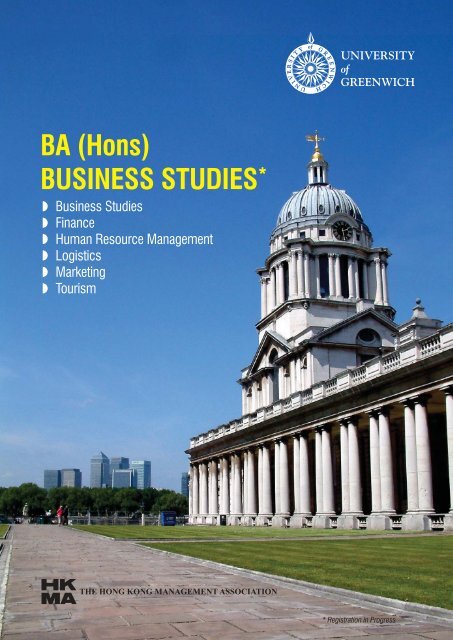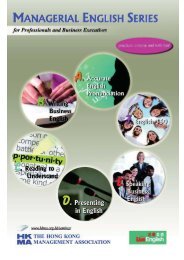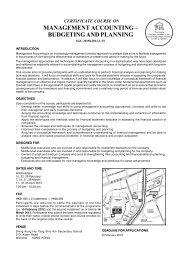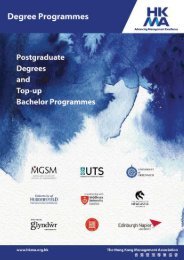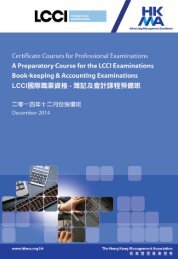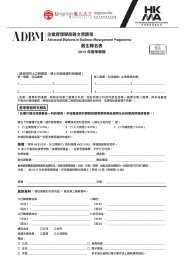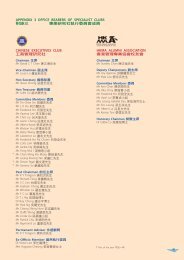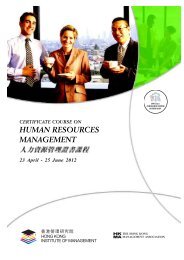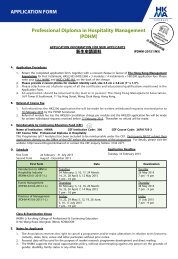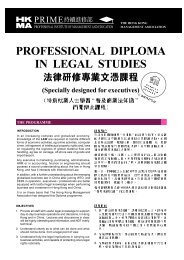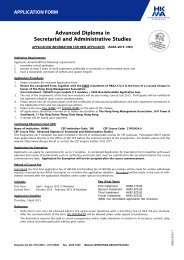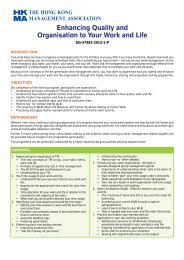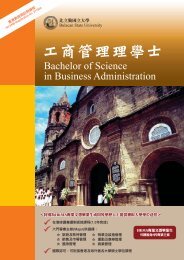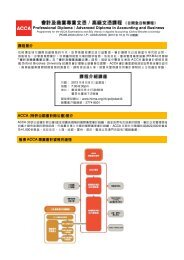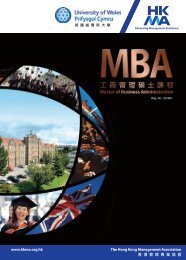BA(Hons)Business Studies - Hong Kong Management Association
BA(Hons)Business Studies - Hong Kong Management Association
BA(Hons)Business Studies - Hong Kong Management Association
You also want an ePaper? Increase the reach of your titles
YUMPU automatically turns print PDFs into web optimized ePapers that Google loves.
<strong>BA</strong> (<strong>Hons</strong>)<br />
BUSINESS STUDIES *<br />
<strong>Business</strong> <strong>Studies</strong><br />
Finance<br />
Human Resource <strong>Management</strong><br />
Logistics<br />
Marketing<br />
Tourism<br />
THE HONG KONG MANAGEMENT ASSOCIATION<br />
* Registration in Progress
Contents<br />
Message from the Head of <strong>Business</strong> School ................................................................... 1<br />
The University of Greenwich ............................................................................................. 2<br />
The <strong>Business</strong> School ....................................................................................................... 3<br />
The <strong>Hong</strong> <strong>Kong</strong> <strong>Management</strong> <strong>Association</strong>....................................................................... 4<br />
<strong>BA</strong>(<strong>Hons</strong>)<strong>Business</strong> <strong>Studies</strong> - Entry with Advanced Standing .......................................... 5<br />
Programme Structure ....................................................................................................... 6<br />
Entry Requirements.......................................................................................................... 7<br />
Study Schedule ............................................................................................................... 8<br />
Why the University of Greenwich <strong>BA</strong>(<strong>Hons</strong>) BS Programmes ........................................ 9<br />
Application Procedure ................................................................................................... 10<br />
Further Information ........................................................................................................ 11<br />
Programme Fees ............................................................................................................ 12<br />
Curriculum of <strong>BA</strong>(<strong>Hons</strong>) BS .......................................................................................... 14<br />
Advancement Path ......................................................................................................... 25
Message from the Head of <strong>Business</strong> School<br />
I am delighted to invite students in <strong>Hong</strong> <strong>Kong</strong> to study our <strong>BA</strong> (Honours) programme in <strong>Business</strong><br />
<strong>Studies</strong> at HKMA.<br />
<strong>Business</strong> success in <strong>Hong</strong> <strong>Kong</strong> or anywhere in the world can only be achieved through people.<br />
Managers need to be educated to respond rapidly, flexibly and effectively to the ever increasing pace<br />
of change in the business world. It is a complex task to develop a programme which provides an<br />
understanding of a range of business disciplines closely linked to their practical applications, and to<br />
facilitate the development of individual management skills.<br />
At the <strong>Business</strong> School we have achieved the right balance. Academic learning is related to real-life<br />
business situations. Our staff’s wealth of international business and teaching experience is evident in<br />
the design of the learning materials that support this programme. The excellent teaching staff at<br />
HKMA will ensure that these materials are delivered in a way that is particularly relevant to students in<br />
<strong>Hong</strong> <strong>Kong</strong>.<br />
I very much look forward to congratulating successful students on the award of their degree.<br />
Professor Leslie Johnson, Head of <strong>Business</strong> School,<br />
University of Greenwich, UK.<br />
<strong>BA</strong> (<strong>Hons</strong>) BUSINESS STUDIES<br />
1
The University of Greenwich<br />
The University of Greenwich is proud of its diverse student body. It is home to a thriving community<br />
of over 23,000 students of all ages. Students from over 140 countries choose to study at Greenwich,<br />
which is also a popular option for local communitites in UK.<br />
The research effort of the University is focused on making contributions to solving real-world problems,<br />
and the advance of issues that have a direct bearing on business, regional and international<br />
communities and ultimately, peoples’ lives. The University’s reserachers all have extensive links with<br />
industry and commerce, public sector bodies and policy makers, supporting its objective to be a<br />
research-informed institution, where students benefit from the experience of academic staff carrying<br />
out leading edge research, and consultancy with business.<br />
Over the past 3 years, the University of Greenwich has generated almost £35 million in research,<br />
consultancy and related commercial activity, and is the leading post-1992 institution for value of its<br />
contract research undertaken with industry.<br />
2<br />
<strong>BA</strong> (<strong>Hons</strong>) BUSINESS STUDIES<br />
2
The <strong>Business</strong> School<br />
The University of Greenwich <strong>Business</strong> School enhances students’ employment prospects by teaching<br />
them the skills and knowledge sought by employers. Academic learning is related to real-life business<br />
situations and is combined with opportunities for work experience and business simulations, providing<br />
students with practical skills. The teaching staff are well qualified academically. Many have professional<br />
qualifications and expertise and bring a wealth of real business awareness and experience. It has a<br />
strong commitment to support the learning needs of each student.<br />
The School is located at the Old Royal Naval College in Greenwich and is ten minutes from London’s<br />
financial centre at Canary Wharf. The campus has state-of-the-art teaching facilities, an excellent<br />
library and substantial computing resources. The School has over 4,000 students, including a<br />
thriving international community, and around 150 full-time staff, as well as many other part-time staff<br />
from industry.<br />
Programme areas including:<br />
• accounting and finance<br />
• business studies<br />
• economics<br />
• entrepreneurship<br />
• events management<br />
• human resource management and organisational behaviour<br />
• international business<br />
• logistics and purchasing<br />
• management<br />
• marketing<br />
• public relations<br />
• tourism<br />
Programmes are constantly revised to reflect current business priorities and the demands of employers;<br />
this ensures students are trained in relevant business applications.<br />
<strong>BA</strong> (<strong>Hons</strong>) BUSINESS STUDIES<br />
3
The <strong>Hong</strong> <strong>Kong</strong> <strong>Management</strong> <strong>Association</strong><br />
The <strong>Hong</strong> <strong>Kong</strong> <strong>Management</strong> <strong>Association</strong> (HKMA) is an apolotical and non-profit making organisation<br />
established since 1960 for the purpose of improving the effectiveness and efficiency of management<br />
in <strong>Hong</strong> <strong>Kong</strong>.<br />
Since its establishment, HKMA has played a major role in conributing to the economic success of<br />
<strong>Hong</strong> <strong>Kong</strong> by providing a wide variety of high quality management training and various services.<br />
As a membership organisation, HKMA currently has a collective membership of over 11,000 from<br />
various business sectors. Members of the Council and Committees consist of eminent persons in<br />
industry, commerce and education who constantly advise on the directions and activities of the<br />
<strong>Association</strong>.<br />
As part of HKMA’s commitment to providing opportunities for the continuting development of local<br />
executives, a full-spectrum of management education programmes are offered, ranging from short<br />
courses and workshops through to Certificate, Diploma, Bachelor, Master and Doctoral Degree<br />
programmes. Each year, over 2,000 integrated and well-balanced courses are offered to approximately<br />
50,000 participants from various business indutries.<br />
As part of the <strong>Association</strong>’s deep commitment in providing opportunities to local executives and<br />
professionals for continuing development, the HKMA is in partnership with various of prestigious<br />
overseas higher education institutions, offers a series of programmes leading to Bachelor’s Master’s<br />
as well as Doctoral degrees in various areas of studies.<br />
The HKMA is collbaorating with the University of Greenwich to offer the Bachelor of Arts(<strong>Hons</strong>)<br />
Degree in <strong>Hong</strong> <strong>Kong</strong>. The Local Secretariat at the HKMA will take care of the administration of the<br />
programme in <strong>Hong</strong> <strong>Kong</strong>.<br />
4<br />
<strong>BA</strong> (<strong>Hons</strong>) BUSINESS STUDIES
<strong>BA</strong>(<strong>Hons</strong>)<strong>Business</strong> <strong>Studies</strong> – Entry with<br />
Advanced Standing<br />
The University of Greenwich and HKMA offer the <strong>BA</strong>(<strong>Hons</strong>) as a continuing professional education<br />
programme through part-time study.<br />
The programme aims to prepare students for careers in business and management by developing in<br />
them, a systematic, broad, analytical business. The programme specifically studies organisations,<br />
business and management and the changing external environment in which students for careers in<br />
business or consultancy by equipping them with both practical skills that enhance their employabilitu<br />
in business, communication and interpersonal skills which will provide the foundation for lifelong<br />
learning. “With” programmes additionally enable students to 6 different subject specialisation including<br />
<strong>Business</strong> <strong>Studies</strong>, Finance, Human Resource <strong>Management</strong>, Logistics, Marketing and Tourism.<br />
The full degree comprises 360 credits for<br />
3 years. The <strong>Hong</strong> <strong>Kong</strong> programme<br />
consists of 180 credits of the degree<br />
offering students with appropriate academic<br />
and professional achievements entry with<br />
Advanced Standing status.<br />
HKMA DMS or other higher diploma<br />
holders may directly enter the 3 rd year of<br />
the <strong>BA</strong>(<strong>Hons</strong>) BS programme covering 4<br />
modules. Whereas HKMA professional<br />
diploma and other ordinary diploma holders may enter the 180 credits (entry to 60 credit at Year 2)<br />
covering a total of 6 modules. The admission Criteria set out the necessary professional qualifications,<br />
business knowledge and experience required by the University when offering Advanced Standing<br />
status to a student. The <strong>BA</strong>(<strong>Hons</strong>) <strong>Business</strong> <strong>Studies</strong> offers a series of programmes with the final<br />
subjects in different areas indicating different specialisations including <strong>Business</strong> <strong>Studies</strong>, Finance,<br />
Human Resource <strong>Management</strong>, Logistics, Marketing and Tourism.<br />
Duration<br />
The <strong>BA</strong> (<strong>Hons</strong>) <strong>Business</strong> <strong>Studies</strong> (with different specializations) – Advanced Standing programme in<br />
<strong>Hong</strong> <strong>Kong</strong> can be completed over a period of 8 to 12 months.<br />
<strong>BA</strong> (<strong>Hons</strong>) BUSINESS STUDIES<br />
5
Programme Structure<br />
YEAR 1<br />
120 Credits Exemption<br />
Qualified Candidates are exempted from this part.<br />
Entry by<br />
Professional<br />
Diploma holders<br />
or equivalent<br />
Diploma holders.<br />
YEAR 2<br />
60 Credits Exemption<br />
Qualified Candidates are exempted from this part<br />
60 Credits<br />
Module 1 Value Chain <strong>Management</strong><br />
Module 2 Creativity & <strong>Business</strong> Decision Making<br />
Entry by<br />
DMS holders<br />
or Higher<br />
Diploma holders.<br />
Module 3<br />
Module 4<br />
Module 5<br />
YEAR 3<br />
120 Credits<br />
Consultancy Project<br />
Managing Strategy<br />
International <strong>Business</strong> Development<br />
DIFFERENT SPECIALIZATIONS<br />
Module 6.1 Small <strong>Business</strong> Development<br />
Module 6.2 Finance<br />
Module 6.3 Employee Relation & Reward<br />
Module 6.4 Contemporary Issues in Logistics<br />
Module 6.5 Contemporary Issues in Marketing<br />
Module 6.6 Tourism Policy & Development<br />
<strong>BA</strong> (<strong>Hons</strong>) BS<br />
<strong>BA</strong> (<strong>Hons</strong>) BS<br />
(With Finance)<br />
<strong>BA</strong> (<strong>Hons</strong>) BS<br />
(With Human Resource<br />
<strong>Management</strong>)<br />
<strong>BA</strong> (<strong>Hons</strong>) BS<br />
(With Logistics)<br />
<strong>BA</strong> (<strong>Hons</strong>) BS<br />
(With Marketing)<br />
<strong>BA</strong> (<strong>Hons</strong>) BS<br />
(With Tourism)<br />
6<br />
<strong>BA</strong> (<strong>Hons</strong>) BUSINESS STUDIES
Entry Requirements<br />
The <strong>BA</strong>(<strong>Hons</strong>) <strong>Hong</strong> <strong>Kong</strong> Programme is an advanced standing status programme. In order to be<br />
admitted into the programme with advanced standing status, applicants must be:<br />
For entry into year 3:<br />
Holders of an advanced diploma from recognized post-secondary institutions such as Diploma in<br />
<strong>Management</strong> <strong>Studies</strong> jointly organized by the <strong>Hong</strong> <strong>Kong</strong> <strong>Management</strong> <strong>Association</strong> and <strong>Hong</strong> <strong>Kong</strong><br />
Polytechnic/ <strong>Hong</strong> <strong>Kong</strong> <strong>Management</strong> <strong>Association</strong> and Lingnan University, or equivalent qualification,<br />
such as relevant Advanced / Higher Diplomas from certain institutes including:VTC, HKU SPACE,<br />
NCC, etc.<br />
For entry to 60 credits at year 2:<br />
Holders of diploma from recognized post-secondary institutions such as Professional Diplomas<br />
offered by the <strong>Hong</strong> <strong>Kong</strong> <strong>Management</strong> <strong>Association</strong>, or VTC Professional Diploma, or other relevant<br />
Associate Degree.<br />
Applicants must be proficient in English Language and may be required to provide evidence of<br />
proficiency (TOEFL 550 or IELTS 6.0) OR Grade D obtained from HKCEE English (Syllabus B) or<br />
Grade D for HKALE English Language, unless their diploma qualification has been undertaken in an<br />
institution where the language of instruction is English.<br />
Award<br />
Upon satisfactory completion of the 4<br />
modules (for higher diploma holders) or 6<br />
modules (for ordinary diploma holders),<br />
students in all specializations will be awarded<br />
the “<strong>BA</strong>(<strong>Hons</strong>) in <strong>Business</strong> <strong>Studies</strong>” degree<br />
certificate by the University of Greenwich.<br />
The specializations will be shown on the<br />
transcript of study.<br />
Recognition of Degree<br />
The <strong>BA</strong>(<strong>Hons</strong>)BS awarded by the University of Greenwich, UK though part-time studies in <strong>Hong</strong><br />
<strong>Kong</strong> carries equivalent academic status and recognition to a Bachelor’s Degree conferred by the<br />
University to home full-time and part-time students in the UK.<br />
<strong>BA</strong> (<strong>Hons</strong>) BUSINESS STUDIES<br />
7
Study Schedule<br />
The programme will be offered over 3 4-months terms; with each term covering 2 modules. The<br />
study schedule for each term would be as follows:<br />
Week<br />
Module 1<br />
Weekday Evenings(6:30pm-10:00pm) or<br />
Weekends (2:00pm – 5:30pm)<br />
Module 2<br />
Weekday Evenings (6:30pm-10:00pm) or<br />
Weekends (2:00pm – 5:30pm)<br />
1<br />
2<br />
3<br />
4<br />
5<br />
6<br />
7<br />
8<br />
9<br />
10<br />
11<br />
12<br />
13<br />
14<br />
15<br />
16<br />
Revision<br />
Exam<br />
Break<br />
Revision<br />
Exam<br />
Break<br />
8<br />
<strong>BA</strong> (<strong>Hons</strong>) BUSINESS STUDIES
Why the University of Greenwich <strong>BA</strong>(<strong>Hons</strong>)<br />
BS Programmes<br />
An express way for a Reputable UK Degree<br />
The University of Greenwich is an internationally recognized university and its degrees are recognized<br />
worldwide. The programme is a fully accredited British undergraduate university degree. The programme<br />
is not available by external study or by examination alone.<br />
Attainable in 8 months<br />
With advanced standing, participants can complete the programme in as short as 8 months with 4<br />
modules or 1 year with 6 modules.<br />
Different Specializations<br />
Students can choose to study different specializations including <strong>Business</strong> <strong>Studies</strong>, Finance, Human<br />
Resource <strong>Management</strong>, Logistics, Marketing and Tourism.<br />
Fully taught by experienced local associate faculty<br />
The programme is taught by local experienced associate faculty with local, innovative and practical<br />
knowledge and therefore participants can easily apply their learning and case studies into their daily<br />
work. Preparation, problem-solving exercise, projects and self-managed learning activities are used<br />
to encourage flexible and independent thinking.<br />
Affordable and competitive programme fee<br />
Degree can be obtained in an affordable and competitive programme fee.<br />
<strong>BA</strong> (<strong>Hons</strong>) BUSINESS STUDIES<br />
9
Application Procedure<br />
How to apply<br />
To apply for a place in the programme, candidates should send the following:<br />
1. Three sets of duly completed Local Assessment Form and Application Form for the University of<br />
Greenwich <strong>BA</strong> (<strong>Hons</strong>) degree programme. (One original set and 2 sets of photocopies).<br />
2. Three sets of photocopies of all certificates of educational qualifications mentioned in the Application<br />
Form, including a full transcript with grades for the diploma level qualification.<br />
3. Three passport sized photographs.<br />
4. Documentary proof of proficiency in English, e.g. Certificate or Diploma programme conducted in<br />
English, HKCEE Certificate with English (Syllabus B; TOEFL 550 or IELTS 6.0)<br />
5. A non-refundable application fee of HK$250.00 (Cheques should be made payable to “The <strong>Hong</strong><br />
<strong>Kong</strong> <strong>Management</strong> <strong>Association</strong>”)<br />
Applications should be sent to:<br />
By Post<br />
The Local Greenwich <strong>BA</strong> Secretariat<br />
The <strong>Hong</strong> <strong>Kong</strong> <strong>Management</strong> <strong>Association</strong><br />
16/F, Tower B<br />
Southmark<br />
11 Yip Hing Street<br />
Wong Chuk Hang<br />
<strong>Hong</strong> <strong>Kong</strong><br />
By Hand<br />
Central Head Office Tel: 2526 6516<br />
Wanchai Centre Tel: 2574 9346<br />
Pico Tower Centre Tel: 2866 4551<br />
First Commercial<br />
Building Centre Tel: 2574 2238<br />
Wong Chuk Hang Centre Tel: 2766 3303<br />
on or before the Deadline<br />
10<br />
<strong>BA</strong> (<strong>Hons</strong>) BUSINESS STUDIES
Further Information<br />
For further details about the programme and enquiries on application procedures, please contact<br />
2774 8592 (Ms Shino Choi) / 2774 8500 (Ms Man Law) / 2774 8511 ext 310 (Ms Toby Chan)<br />
Fax: 2365 1000<br />
Email: degree.greenwich@hkma.org.hk<br />
Website : www.hkma.org.hk/greenwich/babs<br />
Incomplete applications will cause delay in assessment for which HKMA and the University will not be<br />
responsible.<br />
Notification of Results<br />
All applications are assessed by University of Greenwich. Application results will be posted to<br />
individual applicants eight to ten weeks after the application deadline.<br />
<strong>BA</strong> (<strong>Hons</strong>) BUSINESS STUDIES<br />
11
Programmes Fees<br />
For Year 3:<br />
HK$ 14,499 per course x 4 courses<br />
Total Course Fee for year 3: HK$57,996<br />
For 60 credits Year 2<br />
HK$5,992 per course x 2 Courses<br />
Total Course Fee for year 2: HK$11,984<br />
For Entry into year 3: Total course Fee: HK$ 57,996<br />
For Entry into 60 credits Year 2: Total Course Fee = HK$69,980<br />
- Fees are collectable every term which covers 2 courses.<br />
- The fee is a composite fee including the following:<br />
Registration with the University<br />
Induction Seminar<br />
Intensive Seminars conducted by lecturers from the University of Greenwich<br />
Local Study Group<br />
Examinations in <strong>Hong</strong> <strong>Kong</strong><br />
Access to Library Facilities<br />
Student Notes and Essential Textbooks<br />
Local Administration Support<br />
Students should note that all fees are subject to review and many changed by the University.<br />
Financial Assistance<br />
Students on the programmes are<br />
eligible to apply for the Non-means<br />
Tested Loan Scheme (NLS) offered by<br />
the Student Dinancial Assistance<br />
Agency SFAA). For details, please<br />
call 2150 6222 or visit the SFAA<br />
website at www.sfaa.gov.hk. Students<br />
may apply for loan at a competitive<br />
interest rate at the Bank of East Asia.<br />
For details, please call 2211 1211.<br />
12<br />
<strong>BA</strong> (<strong>Hons</strong>) BUSINESS STUDIES
Curriculum of <strong>BA</strong>(<strong>Hons</strong>)BS<br />
Module 1 - Value Chain <strong>Management</strong><br />
The aim of this course is to advance the students’ understanding of how an organisation might gain<br />
strategic advantage through managing people, processes and systems in an integrated manner,<br />
outside the constraints of formal (stove-pipe) organisational structures. Students will learn the key<br />
features of value chain management and examine the various organisational activities that add value<br />
to a company’s product or service. Applying a general model of operations and systems management,<br />
the course concentrates on the importance and benefits of stimulating customer loyalty customisation<br />
where businesses can be differentiated by the volume and variety of their product and service offerings.<br />
Indicative Content<br />
Key theories associated with the value chain approach<br />
General models of operations and systems management<br />
Managing supply and demand<br />
Delivering customer value and satisfaction<br />
Managing vital operations and processes<br />
Designing; processes, products, services, networks and organisations<br />
Resource based and Knowledge based approaches to business operations<br />
Quality, and performance management<br />
<strong>Business</strong> process improvement (BPI) & business process reengineering (BPR)<br />
Flexible operations<br />
Critical success factors (CSFs) and Core Competence<br />
Integration and segmentation<br />
Cross-functionalism, integration and collaboration<br />
E-business and e-commerce<br />
Relationships, responsiveness, stakeholders and ethics<br />
The role of technology (technological systems) in value chains<br />
Organisational control, change and innovation<br />
Energy efficient manufacturing and ecological thinking<br />
Configuring and reconfiguring the value chain in different industries<br />
The value of the brand and building strong brands<br />
Coordinating the integration of people, processes and systems<br />
Creating a value proposition<br />
14<br />
<strong>BA</strong> (<strong>Hons</strong>) BUSINESS STUDIES
Module 2 - Creativity and <strong>Business</strong> Decision Making<br />
Good decision-making is central to business success. This course aims to lead the student into all<br />
levels of business decision-making, from strategic to operational, and provide them with broad<br />
financial understanding so that decisions and their consequences for business can be evaluated<br />
introduce some of the technical tools that inform the decision-making, including further data reduction<br />
and statistical models introduce the strategies and concepts of individual and group creativity and<br />
apply them in commonsense examples from business examine and evaluate decision-making as a<br />
human activity in organisations. As a result of this, students should be able to practice the key skills<br />
relating to good decision-making, both operational and strategic, and be able to critically appreciate<br />
a decision-making process in human and organisational terms.<br />
Indicative Content<br />
Decision context: Nature of decisions. Reactive proactive levels of decision-making and planning.<br />
Decisions and information. Good information. Critical approach to decision making, data gathering,<br />
analysis and interpretation , data reduction and decision support. Decision politics, groups, persuasion<br />
Top down, bottom up. Financial aspects of decision-making: Financial information, familiarisation<br />
with balance sheet and profit and loss account. Financial information - Ratio analysis and interpretation.<br />
Implications for different sectors and comparison. Impact on business planning. Capital and gearing.<br />
Time value of money > Investment/project appraisal, opportunity cost. Payback NPV IRR. Comparison<br />
of appraisal methods. Creative aspects of decision-making: Context of creativity. Aspects of creativity,<br />
individual - improving creativity. Group creativity, brainstorming, six hats. Technical tools supporting<br />
decision-making: Market research, questionnaires, a critical approach. Preparing for negotiation,<br />
lateral thinking - Win-lose, win-win. Critical approach to decisions revisited. Incomplete data<br />
assumption. Risk and probability. Risk and decision-making. Quality decisions, SPC charts and<br />
Normal Variation. Quality decisions, Sampling and hypothesis testing. Time constraints. <strong>Business</strong><br />
scheduling and elements of network analysis. Decision-making strategies.<br />
<strong>BA</strong> (<strong>Hons</strong>) BUSINESS STUDIES<br />
15
Module 3 - Consultancy Project<br />
To provide the opportunity for the student to critique business theory. To provide the opportunity to<br />
integrate and apply skills and knowledge acquired earlier in the programme to a live business<br />
consultancy problem. To develop the students ability to define and analyse a complex business<br />
problem. To help students integrate academic knowledge and practical applications. To give practice<br />
in the specification, collection, analyse and reporting of information. To give the opportunity to<br />
structure and write up large amounts of material. To give experience of planning a project over an<br />
extended time period and meeting a deadline. To facilitate independence of behavior by the students.<br />
Indicative Content<br />
This course will build upon the theoretical aspects introduced in the other courses since these<br />
provide the underpinning knowledge essential for the development of coherent business solutions.<br />
Students will also be expected to utilise the abilities developed in the courses studied in year 2 to<br />
demonstrate creative problem solving; presentation techniques and reflective practice. The content<br />
will focus on consultancy practice and include the following: Managing client perceptions and<br />
expectations <strong>Business</strong> theory and methods Ethical consultancy practice. The project will involve four<br />
stages and four resulting assessments.<br />
1. Project plan and timeline<br />
2. <strong>Business</strong> <strong>Management</strong> report<br />
3. Consultancy presentation<br />
4. <strong>Business</strong> <strong>Management</strong> Executive report.<br />
The course leader will devise workshops whose content is linked to providing knowledge and theory<br />
to help students carry out a substantial piece of work.<br />
16<br />
<strong>BA</strong> (<strong>Hons</strong>) BUSINESS STUDIES
Module 4 - Managing Strategy<br />
The course will develop critical analytical skills relevant to strategic management and will reflect the<br />
plurality of perspectives and approaches to strategic management wherever it is possible and appropriate.<br />
Further, the course will introduce students to the cognitive processes and core analytical tools which<br />
underpin the management of strategy in organisations. The cognitive element is complemented by a<br />
business reality component in the form of a game simulation exercise. For the undergraduate this has<br />
to be a synthetic experience but the skills and know-how acquired should enhance their employability.<br />
Alongside the teaching of tools and skills, students will be encouraged to develop a critical appreciation<br />
of the nature and limits of business strategy and an understanding of the organisational dynamics<br />
involved in strategy development.<br />
Indicative Content<br />
1. Analysis and appraisal: The nature of strategy and its role in the firm. Models of the strategic<br />
process. Identifying different strategic lenses. Environmental scanning. Industry analysis and<br />
industry success factors. Internal capabilities of the firm, distinguishing competencies, market<br />
segmentation, the value chain and key success factors. Generic strategies. The role of intellectual<br />
assets.<br />
2. Strategy formulation: Types of competitive advantage and sustainability. Industry life cycle and<br />
related strategic response. Creating value through diversification. Entry modes of international<br />
expansion.<br />
3. Strategy implementation: Strategic leadership and ethics. Recognising and creating opportunity.<br />
Managing innovation and creativity. Requisite structure and culture. Matters of sustainability.<br />
4. Practical <strong>Business</strong> Decisions: The <strong>Business</strong> Game.<br />
<strong>BA</strong> (<strong>Hons</strong>) BUSINESS STUDIES<br />
17
Module 5 - International <strong>Business</strong> <strong>Management</strong><br />
To give students a clear insight into the major external environmental factors governing international<br />
business management. To provide an understanding of various management functions in an international<br />
context at both a conceptual and a practical level.<br />
Indicative Content<br />
The rationale for going international:Measuring and managing environmental risk. The rise of Foreign<br />
Direct Investment (FDI). Horizontal and vertical FD1. Managing host regulation of FDI. Managing<br />
strategic dilemmas. Relationship between modes of entry, environment and strategy. Managing<br />
international strategic alliances. Organisational structure and culture. Control systems and incentives<br />
in international context. National and international accounting standards and the consequences of<br />
differing standards. Investment decisions and financing decisions. Techniques for global money<br />
management. Managing foreign exchange risk. Human resource considerations in internationallyoriented<br />
companies. Managing international operations.<br />
18<br />
<strong>BA</strong> (<strong>Hons</strong>) BUSINESS STUDIES
Module 6 – Specialisations<br />
6.1 – <strong>Business</strong> <strong>Studies</strong><br />
Course - Small <strong>Business</strong> Development<br />
This unit has three fundamental objectives:<br />
1. To study the factors involved in the initiation of new ventures - and indeed in the termination of<br />
small businesses;<br />
2. To understand the growth processes and pressures facing small businesses as they develop;<br />
3. To appreciate the differences between small business management, enterprising behaviour, and<br />
the ‘pure type’ of the entrepreneur. The course is designed to give students an understanding of the<br />
current academic and pragmatic approaches to small business, enterprise and entrepreneurship.<br />
Indicative Content<br />
Small <strong>Business</strong> as a subject Opportunity search and identification. The start-up process and the<br />
business plan Entrepreneurship: models and traits Sources of finance and support Alternatives to<br />
start-up: franchising, MBO/MBI/BIMBO Models of small firm growth Success factors Failure factors<br />
Contemporary issues Finance Marketing HRM Operations e-commerce and innovation.<br />
<strong>BA</strong> (<strong>Hons</strong>) BUSINESS STUDIES<br />
19
6.2 – Finance<br />
Course - Finance<br />
To provide the students with empirical and theoretical knowledge of the role of the funder and their<br />
preferences in the management of a firm. To enable the student to understand and apply a range of<br />
financial techniques to complicated business circumstances which form the basis for the management<br />
in any commercial environment. To provide the students with an environment in which they can think<br />
critically and develop their information management skills in relation to problem solving within the<br />
financial perspective. Finance as a degree subject requires the students to understand the main<br />
objective of the firm which is maximization of shareholder value and the different internal policies<br />
undertaken by the firm to attain that goal. This requires students to study the risk, return and utility<br />
theories for investors and how investors construct portfolios of investments. Students will also study<br />
how firms make capital structure, dividend policy, risk management and other decisions aimed at<br />
achieving the primary goal of the firm. They will study valuation techniques of assets, businesses and<br />
projects as this is necessary in evaluating the attainment of the above stated objective. There will be<br />
an emphasis on a practical approach to the teaching of the subject to help prepare students for<br />
effective job performance in this area. This will result in requesting students to do exercises in<br />
portfolio theory, valuations, decision making and risk management. They will also learn to prepare<br />
financial management reports.<br />
Indicative Content<br />
The role of financial management in the business enterprise: Economic Rent and Present Value.<br />
The role of the investor: Portfolio Theory and Asset Pricing Theory. Valuation Models for Financial<br />
Assets including Capital Asset Pricing Model (CAPM). Valuation Models for <strong>Business</strong>es. Debt<br />
Instruments. The Capital Structure and Dividends, Risk <strong>Management</strong>.<br />
20<br />
<strong>BA</strong> (<strong>Hons</strong>) BUSINESS STUDIES
6.3 – Human Resource <strong>Management</strong><br />
Course - Employee Relation & Reward<br />
This course covers two major and linked areas of human resource management policy and practice<br />
- employee relations and employee reward. The aims of this course are to develop the student’s<br />
knowledge, understanding and professional competence in the field of employee relations and reward<br />
management. The course provides an understanding of the relationship between management and<br />
employees collectively, whether unionised or not, and individually - which is central to effective<br />
workplace harmony and performance. The aim is to highlight the importance of the legal framework<br />
in managing both employment relations and reward, to examine the strategic choices which employers<br />
confront and to examine recent moves from collective to more individualistic relationships. The<br />
course also aims to emphasise the importance of employee involvement in workplace decisions as a<br />
major route to improved motivation and commitment.<br />
Indicative Content<br />
1. The context of employee relations and reward.<br />
2. Theoretical frameworks for the study of the employment relationship<br />
3. <strong>Management</strong>: objectives and styles of employee relations management.<br />
4. Employees: different forms of employee voice.<br />
5. The State as third party.<br />
6. Processes of decision making.<br />
7. The outcomes of collective bargaining.<br />
8. Employee involvement and participation: management aims.<br />
9. Employee relations practices: Discipline handling, the criteria for the evaluation of procedures,<br />
disciplinary interviewing skills.<br />
10.The contribution of reward management to the effective management of people.<br />
11.The nature, role and aims of reward within an organisation’s corporate and personnel and<br />
development strategies.<br />
12.Pay structures, job evaluation and competency based job evaluation.<br />
<strong>BA</strong> (<strong>Hons</strong>) BUSINESS STUDIES<br />
21
6.4 – Logistics<br />
Course – Contemporary Issues in Logistics<br />
The aim of this course is to advance the students understanding of the critical study of international<br />
and global logistics and to critically appraise the importance of innovation in logistics management.<br />
Contemporary issues in Logistics have gained momentum with the globalisation and the growth of e-<br />
commerce. Logistics are at the heart of any organisation as its role is to interpret strategy and policy<br />
into products and services. Over the past decades there have been some fundamental changes in the<br />
way organisations manage their logistics not only nationally, but on an international basis. The<br />
overall focus of this course is one of exploring current trends, identifying areas of opportunities,<br />
challenges, changes and how these changes have come about and what we might face in the future.<br />
The course is designed to give students a critical understanding of the current academic and pragmatic<br />
approaches to logistics; the context is contemporary logistics both global and local.<br />
Indicative Content<br />
Logistics Strategy<br />
Quality management in Logistics<br />
Logistics in a digital Environment, Relief Logistics<br />
Environmental Issues in Logistics<br />
The industry of 3PL<br />
Green and Reverse Logistics<br />
Critical Logistics Technology in the 21st Century<br />
Logistics in Service Industries<br />
Modern Logistics concepts e.g. Lean, Agile.<br />
22<br />
<strong>BA</strong> (<strong>Hons</strong>) BUSINESS STUDIES
6.5 – Marketing<br />
Course – Contemporary Issues in Marketing<br />
The purpose of this course is: To support the development of marketing students into autonomous<br />
learners and independent thinkers To enable future marketing managers to engage with leading-edge<br />
theory in a positive and open minded way To enable them to envisage the impact of current and future<br />
trends on the role and implementation of Marketing To encourage further research and enquiry into<br />
the ‘edges’ of discipline<br />
Indicative Content<br />
The course is organised around two strands of lectures - Course lectures. These will introduce and<br />
the various cognate fields of study. These will broad in the nature and guide and guide students to<br />
other sources of information and research. Typically they will also provide direction in the completion<br />
of the assignment and exam. These lectures may include –<br />
1. The structure and approach of the course<br />
2. New technology in marketing<br />
3. Marketing ethics<br />
4. Critical approaches to marketing<br />
5. Revision and preparation for the assignment/exam Research and Practice Lectures.<br />
These will be lecture typically examining an academic issue with less breath, but more depth. They<br />
will explore current research interests within the subject group, amongst the faculty in the business<br />
school and of invited visiting academics and practitioners - in relation to the core themes of the<br />
course. They may also relate the experience, practice and concerns of practitioners in marketing also<br />
with reference to the three core themes.<br />
<strong>BA</strong> (<strong>Hons</strong>) BUSINESS STUDIES<br />
23
6.6 – Tourism<br />
Course – Tourism Policy and Development<br />
To critically examine the historical context of tourism policy and its relationship to concepts of<br />
development. To examine the organisational structures and policy frameworks involved in developing<br />
tourism policy. To understand the links between tourism planning and local, regional, national and<br />
international development. To analyse the concepts of sustainable and ethical tourism.<br />
Indicative Content<br />
History of Tourism policy in the UK Understanding development-local, regional, national, international<br />
Development typologies-economic, social, cultural Local or Regional Government and Tourism in the<br />
UK Comparative national tourism policy analysis Sustainable tourism development Ethical Tourism<br />
Funding for Tourism The EU and Tourism development Developing a tourism policy Tourism and<br />
regeneration - urban, rural, cultural<br />
24<br />
<strong>BA</strong> (<strong>Hons</strong>) BUSINESS STUDIES
Advancement Path<br />
<strong>BA</strong> (<strong>Hons</strong>) BUSINESS STUDIES<br />
25
The Local Greenwich <strong>BA</strong> Secretariat<br />
The <strong>Hong</strong> <strong>Kong</strong> <strong>Management</strong> <strong>Association</strong><br />
16/F Tower B Southmark<br />
11 Yip Hing Street<br />
Wong Chuk Hang<br />
HONG KONG<br />
Tel : 2774 8592 / 2774 8500 / 2774 8511<br />
Fax : 2365 1000<br />
Email : degree.greenwich@hkma.org.hk<br />
Website : www.hkma.org.hk/greenwich/babs<br />
Admission is on a competitive and individual basis entirely at the discretion of the respective universities.<br />
Admission criteria and procedures are set by them and are subject to change without prior notice. The <strong>Hong</strong><br />
<strong>Kong</strong> <strong>Management</strong> <strong>Association</strong> does not give any warranty and will not accept any liability regarding the<br />
above.<br />
The information contained in this brochure is correct at the time of printing. The University reserves the right<br />
to vary any information in the brochure at any time without notice.<br />
<strong>BA</strong> (<strong>Hons</strong>) BUSINESS It is matter STUDIES of discretion for individual employers to recognise any qualification to which this course may lead.<br />
BGBS-2010-1


